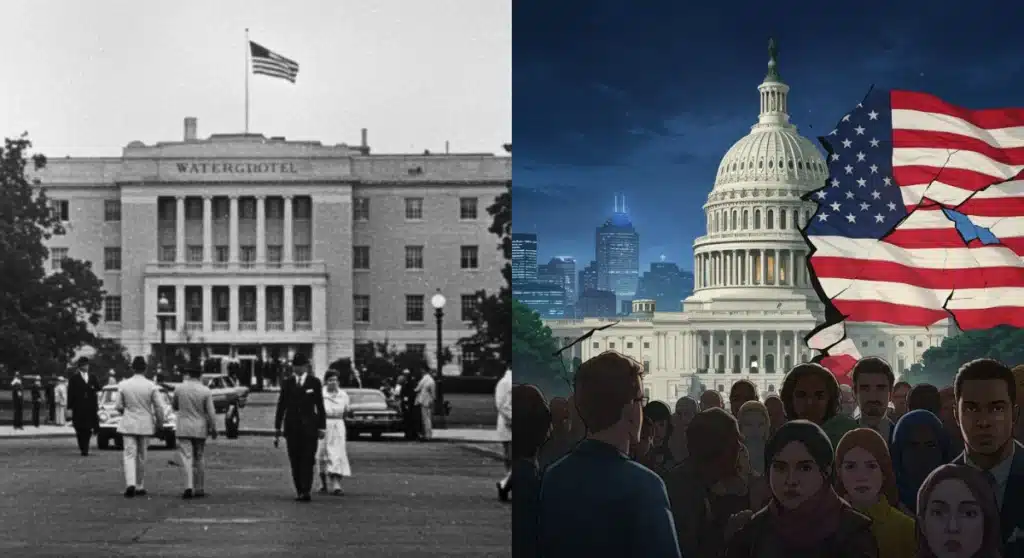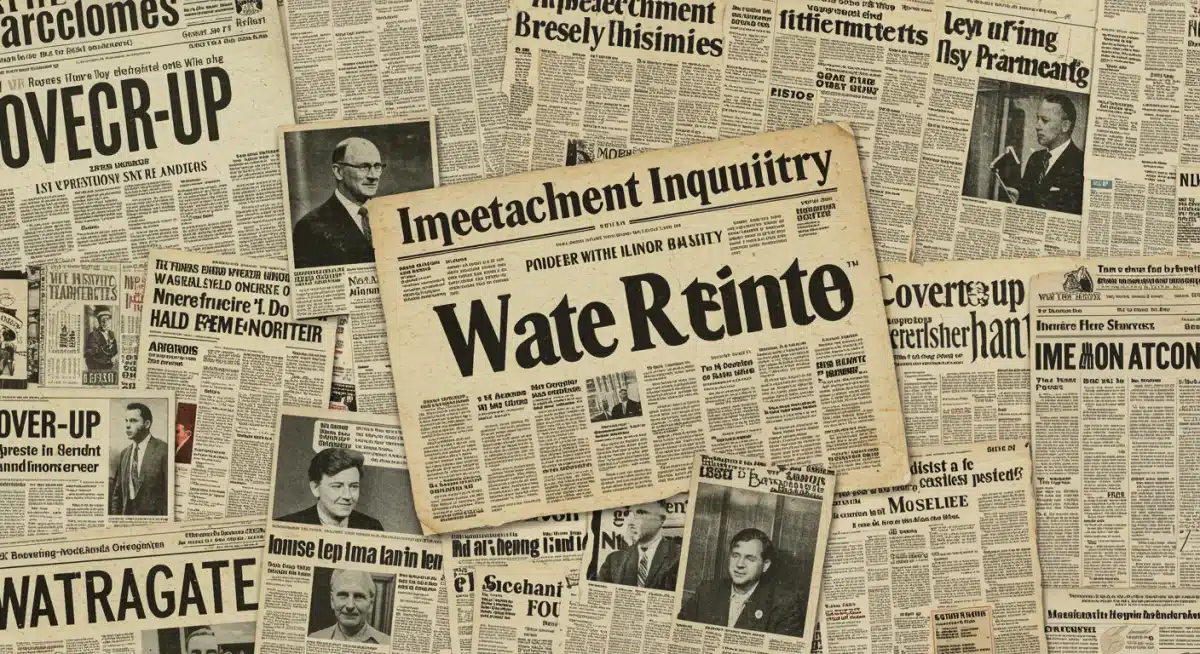Watergate Scandal’s Impact on US Political Trust in 2025

The Watergate Scandal fundamentally eroded public trust in government, a deficit that continues to influence US political dynamics and presents significant challenges to democratic institutions in 2025.
Understanding the Watergate Scandal: Its Impact on US Political Trust and Contemporary Challenges in 2025 is crucial as we navigate an increasingly complex political landscape. The echoes of this pivotal event continue to resonate, shaping public perception and creating ongoing challenges for democratic governance. This article delves into the scandal’s enduring legacy and its relevance today.
The Genesis of Distrust: Unpacking Watergate’s Core
The Watergate scandal, originating from a seemingly minor break-in at the Democratic National Committee headquarters in June 1972, quickly unraveled into a constitutional crisis. This event exposed a systematic abuse of power within the Nixon administration, ultimately leading to President Richard Nixon’s resignation in August 1974.
The core of Watergate was not just the burglary itself, but the subsequent cover-up and the administration’s efforts to obstruct justice. This intricate web of deceit profoundly shook the foundations of American governance and public confidence.
The Break-in and Initial Cover-up
On June 17, 1972, five men were arrested for breaking into the DNC offices at the Watergate Hotel. Initially dismissed by the White House as a “third-rate burglary,” investigative journalists and a persistent judiciary soon revealed deeper connections.
- June 17, 1972: Five men arrested at DNC headquarters.
- August 1, 1972: Initial reports link burglars to CRP (Committee to Re-elect the President).
- September 15, 1972: Grand jury indicts the five burglars and two others.
- January 30, 1973: Burglars convicted, some plead guilty.
The administration’s immediate response was to deny involvement and actively suppress information. This initial phase of the cover-up laid the groundwork for the growing public skepticism that would define the era.
Erosion of Public Confidence: A Lasting Scar
The Watergate scandal delivered a devastating blow to public trust in government, a wound that has never fully healed. Before Watergate, Americans generally held a higher degree of faith in their leaders and institutions. The scandal shattered this perception, revealing a dark underbelly of political machinations and ethical breaches.
The systematic deception, surveillance, and attempts to silence critics exposed during Watergate created a pervasive sense of betrayal. Citizens began to question the integrity of their elected officials and the very mechanisms designed to protect democracy.
Impact on Presidential Authority
The presidency, once seen as an almost sacrosanct office, was tarnished. Nixon’s actions, particularly his attempts to withhold evidence and obstruct investigations, led to a significant reevaluation of executive power.
- Reduced Deference: Public and media now scrutinize presidential actions more intensely.
- Congressional Oversight: Strengthened congressional role in checking executive power.
- Ethics Legislation: Introduction of new laws aimed at government transparency and accountability.
This shift in public and institutional attitudes has meant that every subsequent administration operates under a heightened level of scrutiny, with the specter of Watergate often invoked during times of political controversy.

Media’s Role: The Fourth Estate’s Triumph
The Watergate scandal is often cited as a prime example of the power of investigative journalism and the crucial role of a free press in a democratic society. Reporters Bob Woodward and Carl Bernstein of The Washington Post, guided by their anonymous source “Deep Throat” (later identified as FBI Associate Director Mark Felt), relentlessly pursued the truth.
Their reporting, often against significant pressure and White House denials, gradually unveiled the extent of the conspiracy. This unwavering commitment to uncovering facts earned them a Pulitzer Prize and solidified the media’s image as a vital check on government power.
Defining Moments in Journalism
The Washington Post’s persistence demonstrated that a determined press could hold even the highest office accountable. This period saw a renewed focus on in-depth, investigative reporting, inspiring a generation of journalists.
The scandal also highlighted the importance of protecting journalistic sources and the need for independent news organizations. It underscored that a well-informed public is essential for a functioning democracy.
While the media’s role in Watergate is lauded, it also set a precedent for adversarial journalism, sometimes leading to tension between the press and political establishments in later years. The balance between scrutiny and sensationalism remains a perpetual challenge for news organizations.
Legislative Reforms and Government Accountability
In the wake of Watergate, a series of legislative reforms were enacted to prevent similar abuses of power and enhance government transparency and accountability. These measures aimed to restore public faith by making government operations more open and officials more answerable for their actions.
Key reforms included changes to campaign finance laws, the establishment of independent ethics offices, and strengthening congressional oversight capabilities. These legislative efforts were a direct response to the systemic failures exposed by the scandal.
Post-Watergate Legislation
- Federal Election Campaign Act Amendments of 1974: Limited campaign contributions and established the Federal Election Commission.
- Government in the Sunshine Act of 1976: Mandated that many government meetings be open to the public.
- Ethics in Government Act of 1978: Created independent counsels to investigate high-level government misconduct and required financial disclosures from officials.
These reforms, while significant, have faced ongoing challenges and modifications over the decades. Their effectiveness is continually debated, especially concerning campaign finance and the scope of executive privilege.
Watergate’s Echoes in Contemporary Challenges (2025)
In 2025, the legacy of Watergate continues to shape the American political landscape, particularly regarding public trust and governmental challenges. The skepticism born from the scandal has evolved into a persistent distrust of institutions, impacting everything from election integrity debates to public health responses.
The current political environment is characterized by deep partisan divisions and a pervasive sense of cynicism, often attributed in part to the foundational erosion of trust initiated by Watergate. This makes building consensus and implementing effective policy solutions significantly more difficult.
Current Manifestations of Distrust
Today, we observe several contemporary challenges that echo the Watergate era:
- Information Disinformation: The struggle against fake news and misinformation mirrors the public’s difficulty discerning truth amidst official denials during Watergate.
- Executive Power Debates: Ongoing discussions about the limits of presidential authority and executive privilege frequently draw parallels to Nixon’s actions.
- Whistleblower Protections: The importance of whistleblowers, like Deep Throat, remains a critical aspect of ensuring government accountability, particularly in complex national security matters.
These challenges highlight that while the specific events of Watergate are in the past, its fundamental lessons about accountability, transparency, and the fragility of trust remain acutely relevant.
Rebuilding Trust: The Path Forward
Rebuilding public trust in government and political institutions remains a critical task in 2025. The journey involves a multi-faceted approach that addresses both the historical grievances and current challenges. It requires concerted efforts from political leaders, media, and citizens alike.
Transparency, accountability, and ethical leadership are paramount. Without a renewed commitment to these principles, the lingering effects of Watergate—a deep-seated skepticism—will continue to hinder effective governance and civic participation.
Strategies for Trust Restoration
Several strategies are essential for fostering a more trustworthy political environment:
- Enhanced Transparency: Making government processes and decision-making more open to public scrutiny.
- Stronger Ethics Enforcement: Implementing and rigorously enforcing ethical guidelines for all public officials.
- Civic Education: Educating citizens about democratic processes and their role in holding leaders accountable.
- Responsible Media: Supporting and consuming credible journalism that provides factual and unbiased reporting.
The path to rebuilding trust is long and arduous, but it is indispensable for the health and vitality of American democracy. Learning from the past, particularly from events like Watergate, provides invaluable insights for navigating the complexities of the present and future.
| Key Aspect | Brief Description |
|---|---|
| Erosion of Trust | Watergate fundamentally damaged public faith in government and political leaders. |
| Media’s Vital Role | Showcased investigative journalism as a crucial check on governmental power. |
| Legislative Reforms | Led to new laws promoting transparency and accountability in government. |
| Contemporary Relevance | Continues to influence political distrust and challenges democratic stability in 2025. |
Frequently Asked Questions About Watergate’s Legacy
The immediate impact was President Nixon’s resignation, the indictment and conviction of several top officials, and a profound shock to the American political system. It led to widespread public disillusionment and a reevaluation of executive power, marking a turning point in public trust in government.
Watergate significantly elevated the media’s role, particularly investigative journalism. It showcased the press as a crucial watchdog against government overreach, leading to increased scrutiny of public officials and inspiring a new era of aggressive reporting. It reinforced the concept of the “fourth estate.”
Key legislative changes included the Federal Election Campaign Act Amendments of 1974, the Government in the Sunshine Act of 1976, and the Ethics in Government Act of 1978. These laws aimed to increase transparency, limit campaign contributions, and establish independent oversight for government ethics.
Watergate remains relevant in 2025 because its legacy of eroded public trust continues to influence political discourse, contribute to partisan divisions, and challenge democratic institutions. Debates over executive power, government transparency, and media credibility frequently reference lessons learned from the scandal.
Fully restoring public trust is an ongoing and complex challenge. It requires consistent ethical leadership, increased governmental transparency, robust accountability mechanisms, and responsible journalism. While complete restoration may be aspirational, continuous efforts can mitigate the skepticism fostered by events like Watergate.
Looking Ahead: Sustaining Democratic Integrity
The enduring impact of Watergate political trust continues to resonate in 2025, serving as a stark reminder of the fragility of democratic institutions and the constant need for vigilance. As new challenges arise, including the rapid spread of misinformation and evolving threats to electoral integrity, the lessons from Watergate—about accountability, transparency, and the crucial role of an informed public—are more vital than ever. The ongoing efforts to uphold these principles will define the future of American political trust and the resilience of its democratic system.





